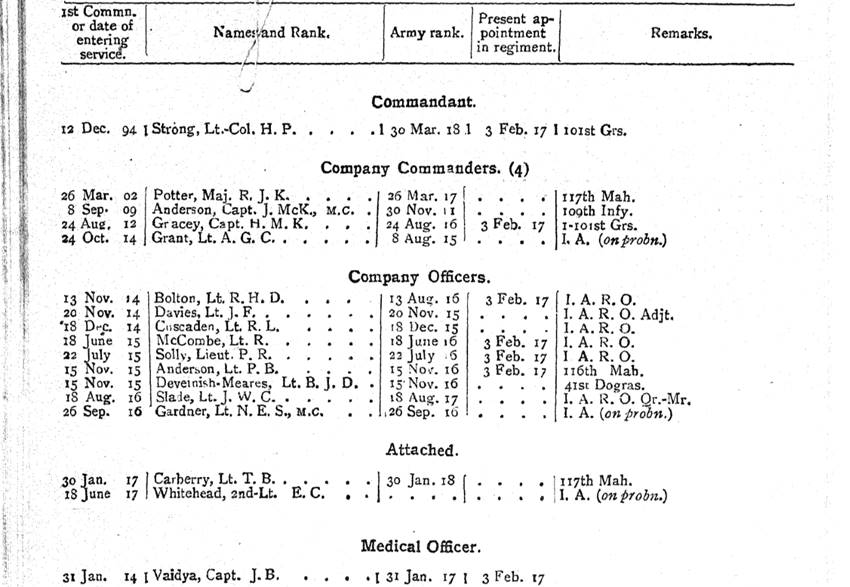This article is about the short-lived 2nd Battalion 101st Grenadiers and will help you research those who served with the Battalion during the First World War. I have also written an article on the 1st Battalion 101st Grenadiers and a series of guides to help you research soldiers who served in the Indian Army during the war:
The 2nd Battalion 101st Grenadiers in the First World War
Lineage: The 2nd Battalion 101st Grenadiers was formed at Suez, Egypt on 3 February 1917 and disbanded on 31 January 1921. For a history of the Regiment’s lineage see my page on the 1st Battalion 101st Grenadiers.
Class Composition of Battalion in 1919: 1 Company of Dekhani Mahrattas, 1 Company of Konkani Mahrattas, 1 Company of Rajputana Mussalmans and 1 Company of Punjabi Mussalmans.
The extract below was taken from the July 1918 Indian Army List and recorded the British officers serving with the Battalion. The Indian Army List is an important resource to research British or Indian officers of the Indian Army but is full of jargon but I have created a page to help you: Indian Army Abbreviations and Acronyms List.
War Diaries of the 2nd Battalion 101st Grenadiers
There are two war diaries for the 2nd Battalion 101st Grenadiers and as of January 2018, neither has been digitized and they can only be viewed at the National Archives.
- Date: 01 February – 30 December 1917
- 49th Indian Infantry Brigade, Suez Canal Defences
- Reference: WO 95/4436
- Notes:
- Date: 01 January – 30 November 1918
- 31st Infantry Brigade, 10th (Irish) Division, Egyptian Expeditionary Force
- Reference: WO 95/4586
- Notes: A very good war diary which is full of detailed information especially when the Battalion is in action. Especially the Battle of Megiddo. There are a large number of appendices including operation orders, messages, and maps.
Further Sources for the 2nd Battalion 101st Grenadiers
If you are researching a British or Indian officer who served in the 2nd Battalion 101st Grenadiers then the Indian Army List can be consulted.
Extracts from War Diaries of the 2nd Battalion The 101st Grenadiers
01 January – 30 November 1918, Egyptian Expeditionary Force, WO 95/4586
21 January 1918 – Gaza – Arrived Gaza ( ref map Syria 1:250.000 Jerusalem) 05.00 hours. Detrained and offloaded immediately. Encamped on ridge Northeast of town. Good ground on slope overlooking wide seep of sparsely grassed country. Water and firewood apparently somewhat scarce but small nullah at a distance of 400 yards from camp in which a considerable amount of rainwater has collected which may be useful.
05 March 1918 – The commanding officer and adjutant rejoined after a weeks visit to the front line to study modern tactics. They were there attached to the 123rd Outram’s Rifles.
09 March 1918 – Brigade Field Exercise. The rounding up of an Enemy Raiding Column of 1000 rifles with machine guns operating in this area. An imaginary battery of Royal Field Artillery were attached to the Brigade for the exercise and Battalion machine guns brigaded.
31 May 1918 Fighting platoons organised at Battalion Headquarters and from men doing transport duties… Battalion has been in frontline 11 days. Condition of men good and they are working well. Advantage being taken of moonlight to push on completion of double wire fence, strengthening work and improvement of communications. Enemy opposite this unit quiet.
12 June 1918 – 12.00 1 Indian officer and 11 other ranks proceeded on a visit to Jerusalem. The party consisted of Mohammedans. The time allowed seems short as it will only admit one full day there.
15 June 1918 – Havildar Jujar Khan died of fever, thought to be cerebral malaria. He was on ‘stand to’ parade at dawn and died at 11.30.
17 June 1918 – One Company A of 38th Royal Fusiliers (Jewish Battalion) came to be attached for 48 hours in order to gain experience of front-line work. One platoon went to each company of ours. They arrived at 21.00 hours after a long march so could not ‘double up’ without men for duties in frontline sangars that night.

